Oatmeal for breakfast: how often can you eat it and why can't you eat it every day?

The first and main meal is breakfast. It must contain the entire spectrum of components necessary for the human body: proteins, fats and carbohydrates. Oatmeal works well for this.
Product Introduction
Oatmeal is a steamed, polished whole grain with a high nutritional value. Dishes from it are a storehouse of fiber and complex carbohydrates. Oatmeal is enriched with vitamins A and E, group B and minerals important for human life: iron, potassium, zinc, calcium and magnesium.
In pursuit of cooking time, whole-grain oats were technologically processed into oatmeal. During the conversion process, the outer layer is removed from the cereal, along with the lion's share of fiber and a small amount of vitamins. Therefore, oatmeal - hercules - is slightly inferior in usefulness to its progenitor. But the time of cooking porridge decreased from 1 hour to 15 minutes.
Without harm to health for breakfast, you can eat oatmeal for people without gastrointestinal diseases. You can not just eat it very often, for example, three times a day. Reviews of oatmeal for breakfast are mostly positive.
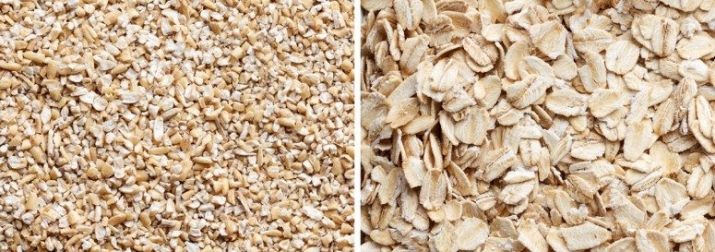
Consumption rates
You can eat oatmeal at least every day, but in small portions: up to 200 g. 100 g will contain:
- 215 kcal;
- 5 g protein;
- 8 g fat;
- 30 g of carbohydrates.
The ideal frequency of eating oatmeal is 3 times a week. More frequent or larger portions of the use of this cereal threatens with a subsequent lack of calcium in the body. It is washed out by phytic acid, which is part of oatmeal. Oatmeal, eaten in the morning or in the afternoon, due to the slow breakdown of carbohydrates, will give you a boost of energy and a feeling of complete satiety for several hours.
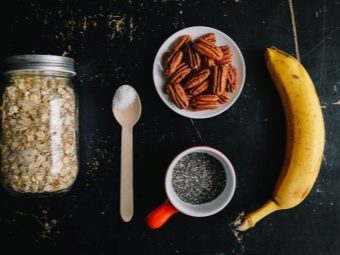
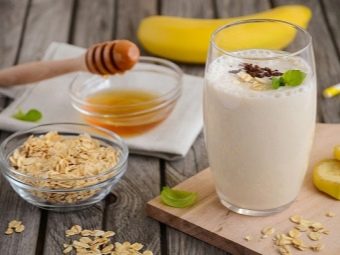
There are several groups of people who eat oatmeal in a different way.
- Adhering to a diet that is therapeutic for the gastrointestinal tract. Doctors often recommend whole-grain oatmeal to patients with gastritis or stomach ulcers, as it helps to eliminate stomach pain. You can eat it even during an exacerbation of the disease. To avoid irritation of the stomach, cereals should be boiled for a long time and consumed 100-200 g in the morning or at lunchtime.
- Dieting for weight loss. A cheap and effective diet for weight loss on oatmeal has been used for more than a dozen years. In order to lose weight, you need to eat only oatmeal for a week. It is boiled in water or soaked in fermented milk products and consumed three times a day. The oatmeal diet can be used no more than twice a year due to the risk of hypocalcemia.
- Bodybuilders and athletes. Possessing the property of long-term saturation of the body, porridge energizes and gives a lot of strength for training. It is necessary to consume oatmeal immediately before playing sports. In the diet of bodybuilders, protein foods predominate, which leads to problems with the gastrointestinal tract. To eliminate unpleasant ailments, athletes need to add fiber-rich oatmeal to their meals. It balances the diet and soothes the digestive tract.
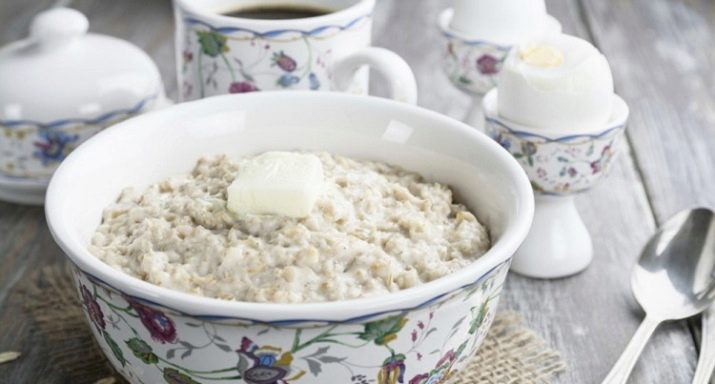
Beneficial features
Oatmeal is a budget friendly and smart dish and should be included in everyone's diet. The beneficial properties of fiber, which is part of oatmeal, deserve special attention:
- cleansing and stabilization of the gastrointestinal tract;
- preventing hunger and preventing overeating;
- lowering cholesterol levels and cleansing blood vessels.
In addition, oatmeal is used as a prevention of thyroid diseases, because it contains iodine and iron. Whole grain oats have a low glycemic index and help control glucose levels in the body. Such porridge can be used by people suffering from diabetes. Oatmeal positively corrects the functioning of the nervous system, including the brain. With silicon, vitamin B and phosphorus, oatmeal:
- improves memory and concentration;
- strengthens nerve cells;
- activates cerebral circulation.
Oatmeal is a low-calorie dish, it regulates the amount of cholesterol in the blood, thereby preventing weight gain.

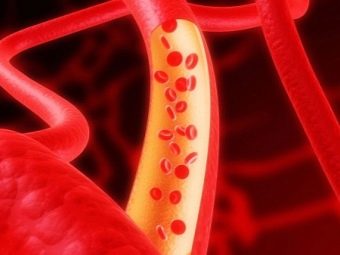
Side effects and contraindications
Not observing the measure in the use of oatmeal, you can get an unpleasant diagnosis: hypocalcemia. Phytic acid, which is part of oats, in large quantities begins to block the presence of calcium in the body. Therefore, it is not recommended to abuse oatmeal:
- older people: they have an increased risk of developing osteoporosis;
- children: they need calcium for the formation of a strong skeleton.
In middle-aged people, calcium deficiency in the body is expressed by weakness and fatigue. The appearance of a person suffers:
- the skin becomes dry and flaky;
- the condition of the teeth worsens, caries appears;
- nails and hair become brittle and dull.
With prolonged calcium deficiency, the nervous, muscular and cardiovascular systems suffer. Oatmeal dishes are contraindicated for people with celiac disease - gluten intolerance. It damages the villi on the walls of the small intestine, causing many detrimental effects.
In patients with celiac disease, after regular use of oatmeal, frequent foamy stools appear, the stomach swells, the skin becomes dry, hair and nails become brittle. Then dystrophy and fragility of bones develop.

Cooking features
The choice of oatmeal is often influenced by the method and time of its preparation. The longer the oatmeal cooks, the healthier it is. Coarsely ground oatmeal is considered the best option; you can cook porridge from them in 20 minutes.
Oatmeal porridge-minutes
Technologically, the most prepared oatmeal is instant porridge. Oats are repeatedly subjected to heat treatment, grinding and flattening, useful vitamins and minerals do not remain in it at all. Fiber is also not mentioned in the composition of oat minutes, but the amount of starch exceeds the allowable limits. And also a minus of oatmeal porridge-minutes can be considered the presence of flavors, flavor enhancers and other chemicals in the composition. Instant oatmeal is harmful:
- children under 8;
- people with gastrointestinal diseases;
- people on a diet.

whole grain oats
The maximum benefit will bring porridge from minimally processed cereals. It will take 1 hour to cook, provided it is pre-soaked. Cooking whole oats is better with water or half milk. During cooking, the porridge must be constantly stirred. The result is a very viscous and not very pleasant-looking dish.It is easy to correct this feature by adding berries, fruits, grated chocolate or, if this is a savory version of the dish, chopped cheese to the finished porridge.
To enrich an already very nutritious dish, it is recommended to add a piece of butter to the porridge, and for sweetness and aroma - a spoonful of honey. Whole grain oatmeal is a good side dish. If you add fried onions, carrots, tomatoes and bell peppers to the cooked porridge, then it can be served for lunch with meat or fish.
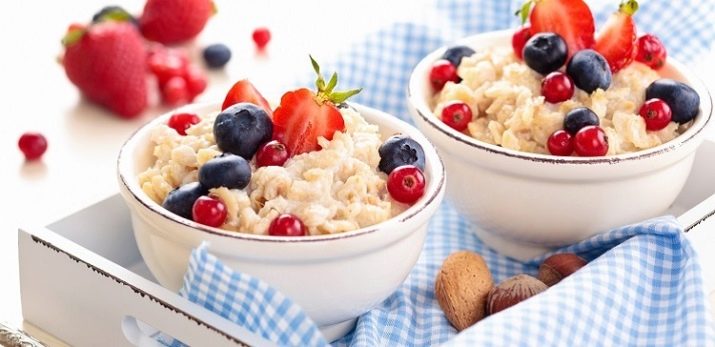
Flakes
Practical and healthy, oat flakes take 3 to 30 minutes to cook. The porridge is prepared:
- on kefir or yogurt;
- on the water;
- on milk.
In the first case, the flakes are mixed with a fermented milk product and the necessary additives (berries, nuts, chocolate, fruits) and left to swell for several hours. General practitioners and nutritionists often disagree on which oatmeal is healthier: boiled in water or in milk. Nutritionists lean towards the water option because it has fewer calories. Therapists, on the other hand, argue that many of the beneficial vegetable proteins that make up oatmeal are absorbed only in the presence of animal or milk fat. That is why children should boil milk oatmeal. It has a more complete and intelligent composition of nutrients. To prepare oatmeal, you need to bring the liquid to a boil, pour the dry product into it and, stirring, cook until tender. Then add oil, salt and fillers to the porridge to taste.
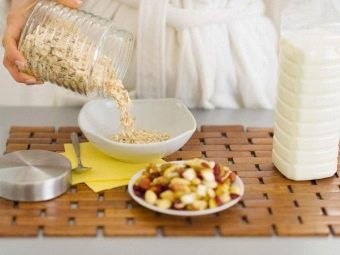
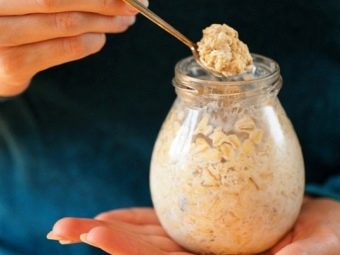
This video is about how to cook delicious oatmeal in water.

















